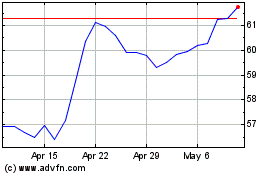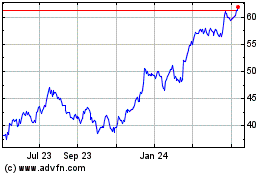Stumpf to cede $41 million as board targets executives in wake
of sales scandal
By Emily Glazer
Wells Fargo & Co. Chairman and Chief Executive John Stumpf
will forfeit $41 million for the bank's burgeoning sales scandal,
marking one of the biggest rebukes to the head of a major U.S.
financial institution.
The bank's board moved to rescind pay for Mr. Stumpf and former
community- banking head Carrie Tolstedt ahead of a hearing of the
House Financial Services Committee Thursday. Wells Fargo's board
said Ms. Tolstedt, who oversaw retail banking during bad behavior
there, will forfeit unvested equity awards valued at $19
million.
The board said she won't exercise "outstanding options" during
an investigation into the bank's sales practices. Ms. Tolstedt has
also left the bank, earlier than her planned Dec. 31
retirement.
Clawbacks, or their absence, became a big focus of a Senate
Banking Committee hearing last week into the bank's sales tactics,
which earlier resulted in a $185 million fine and regulatory
action. During his appearance before that panel, Mr. Stumpf and the
bank were roundly criticized for firing 5,300 employees over five
years, yet taking no action against top executives. As many as two
million accounts were opened using fictitious or unauthorized
information.
The awards being forfeited by Mr. Stumpf represent about a
quarter of the total compensation he has accrued over his nearly 35
years at the bank, according to an independent analysis by
human-resources consultancy Overture Group LLC. Mr. Stumpf earned
total compensation of $19.3 million in 2015.
The bank said that the $41 million is from Mr. Stumpf's unvested
equity awards. It also said that he would forgo salary during an
independent investigation the board is leading and has recused
himself from all matters related to that as well as independent
directors' deliberations. Neither he nor Ms. Tolstedt will receive
a bonus for 2016.
Ms. Tolstedt couldn't be reached for comment. Mr. Stumpf
declined to comment through a bank spokesman.
The bank's lead independent director, Stephen Sanger, said in
the board's statement that further action may be warranted. The
board's independent directors "will take such other actions as they
collectively deem appropriate, which may include further
compensation actions before any additional equity awards vest or
bonus decisions are made early next year, clawbacks of compensation
already paid out, and other employment-related actions."
The results of that investigation, for instance, will determine
what becomes of Ms. Tolstedt's roughly $35 million in unvested
options, according to a person familiar with the matter.
The closest a big-bank CEO has come in recent years to such a
clawback occurred at J.P. Morgan Chase & Co. That bank halved
annual compensation in 2012 for chief James Dimon to $11.5 million
from $23.1 million in 2011 due to its London Whale trading scandal.
But J.P. Morgan didn't formally claw back compensation.
J.P. Morgan did impose the maximum pay clawbacks on three
traders and other executives involved with the debacle, which cost
the bank around $6 billion. Ina Drew, the former bank executive who
oversaw the unit at the heart of the scandal, volunteered to return
pay in line with the maximum clawback.
Otherwise, there have only been sporadic instances of attempts
to recover pay on Wall Street, usually involving lower-level
employees.
Action on pay is again likely to be an issue before the House
panel. Rep. Jeb Hensarling (R., Texas), chairman of the Financial
Services Committee, told reporters at a conference Tuesday that
Wells Fargo shareholders would be justified in calling for
compensation to be forfeited.
"If I was a shareholder, I'd be outraged if there weren't
clawbacks," Mr. Hensarling said. He promised to use his hearing and
a committee investigation to find out how a "fraud of this massive
scale took place" at the lender.
"Tonight's announcement is a step in the right direction but
there are still dozens of unanswered questions," said Sen. Sherrod
Brown (D., Ohio), the top Democrat on the Senate Banking Committee.
But he added that they still don't know how many customers were
harmed, how long the "fraud" continued and how many low-paid
employees were fired for failing to meet sales goals.
In a prepared opening statement for Thursday's hearing, Mr.
Stumpf didn't address issues related to pay, according to a copy of
the testimony reviewed by The Wall Street Journal. He did say the
bank would be accelerating its decision to end sales goals for
retail-banking employees by October 2016 instead of January 2017,
the date initially given when the change was announced earlier this
month.
Ms. Tolstedt became a point of focus at the Senate hearing. She
stepped down from her role in July and was set to retire at
year-end. Her total compensation, including accumulated stock and
options earned over her 27 years at the bank, could run to about
$96 million, according to a letter Wells Fargo sent senators last
week. Ms. Tolstedt received total compensation for 2015 of $9.05
million.
In response to heated questions about Ms. Tolstedt's
compensation during the Senate hearing, Mr. Stumpf said that is a
matter for the board's human-resources committee. While Mr. Stumpf
is chairman of the board, he isn't a member of that committee,
which is led by Lloyd H. Dean, president and chief executive of
Dignity Health, a San Francisco-based not-for-profit health-care
system.
His answer, though, brought a rebuke from one senator. "The
board should have already acted to claw back those salaries," Sen.
Heidi Heitkamp (D., N.D.) said at the hearing. "If you had come
here and said, the board now is clawing back, these are the things
that we're doing...you would be in a lot better position sitting in
that chair right now."
The board last week tapped Shearman & Sterling LLP to advise
it on whether and how it should claw back pay from top executives,
the board confirmed Tuesday in a news release. The law firm is also
leading an independent investigation for the board.
Wells Fargo, like other banks, has detailed clawback policies
and provisions. "Wells Fargo has strong recoupment and clawback
policies in place" in part to discourage its senior executives from
taking "imprudent or excessive risks that would adversely affect
the company," the bank said in its latest proxy statement.
Such provisions can be triggered by misconduct that does
reputational harm to the bank; improper or grossly negligent
failure, including in a supervisory capacity, to monitor or manage
material risks to the bank or business group; and a material
failure of risk management, among others.
In 2013, Wells Fargo agreed to enhance its clawback policy in
exchange for New York City pension funds dropping a related
shareholder resolution proposed by the city comptroller's office.
New York City pension funds own almost $500 million in Wells Fargo
stock.
Under the revised policy, bank directors can recover pay from
employees engaged in misconduct and from executives who supervised
them. "This bank needs to regain trust from both the public and
investors, and clawing back profits from senior management would be
a step in the right direction," New York City Comptroller Scott M.
Stringer said in a statement.
The Wells Fargo sales-practices scandal has already rekindled
debate about clawbacks. Regulators earlier this year proposed
tighter restrictions on how Wall Street bankers are paid and are
finalizing the rules.
Among them is a requirement for the biggest firms to claw back
bonuses from employees engaged in misconduct that results in
significant financial or reputational harm or any fraud. Those
proposed rules would require banks to take back pay for wrongdoing
for at least seven years after the executive receives the
payment.
Bankers have resisted the proposals, saying they have already
tightened compensation standards and adopted voluntary clawback
policies.
Gabriel T. Rubin and Yuka Hayashi contributed to this
article
Write to Emily Glazer at emily.glazer@wsj.com
(END) Dow Jones Newswires
September 28, 2016 02:47 ET (06:47 GMT)
Copyright (c) 2016 Dow Jones & Company, Inc.
Wells Fargo (NYSE:WFC)
Historical Stock Chart
From Mar 2024 to Apr 2024

Wells Fargo (NYSE:WFC)
Historical Stock Chart
From Apr 2023 to Apr 2024
